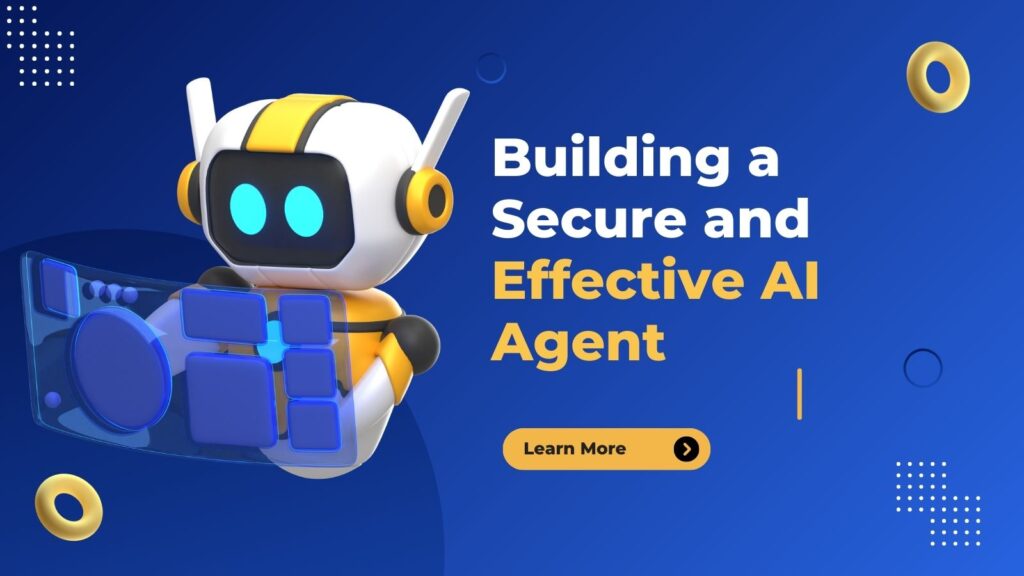How to Create a Transportation App: Features,
Price, and Implementation Steps
29 Aug 2023
18 min

CTO

Technical Writer
In today’s fast-paced, technology-driven world, businesses must adapt to stay competitive. Artificial intelligence (AI), particularly AI agents, is one of the most transformative tools available. These intelligent systems, capable of automating tasks, analyzing data, and interacting with customers, are no longer a futuristic concept—they’re a necessity.
In this article, we’ll break down what AI agents are, why they matter, and most importantly—why your business needs a clear AI agent strategy today, not tomorrow.
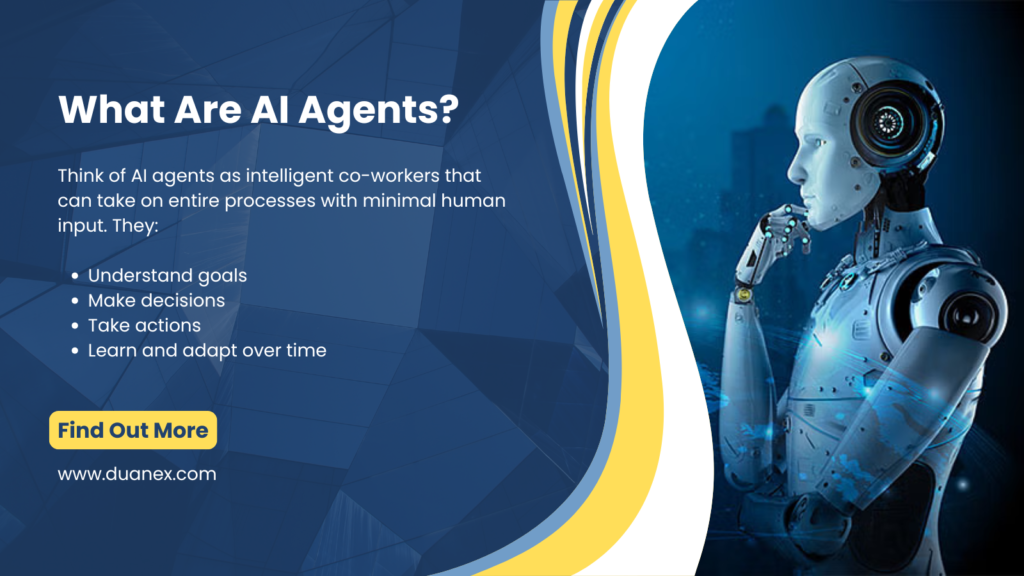
What are AI Agents?
AI agents are software systems powered by artificial intelligence that can perform tasks autonomously or semi-autonomously. Unlike traditional software, AI agents learn from data, adapt to new information, and make decisions with minimal human intervention. Examples include chatbots for customer service, virtual assistants for scheduling, and predictive analytics tools for inventory management. Think of AI agents as intelligent co-workers that can take on entire processes with minimal human input. They:- Understand goals
- Make decisions
- Take actions
- Learn and adapt over time
They can handle tasks like qualifying leads, managing internal support tickets, automating compliance workflows, and even executing multi-step business processes across different software systems.
The key difference between traditional automation and AI agents is autonomy. Instead of just responding to inputs, AI agents can set subgoals, coordinate with other systems or agents, and operate in dynamic environments.
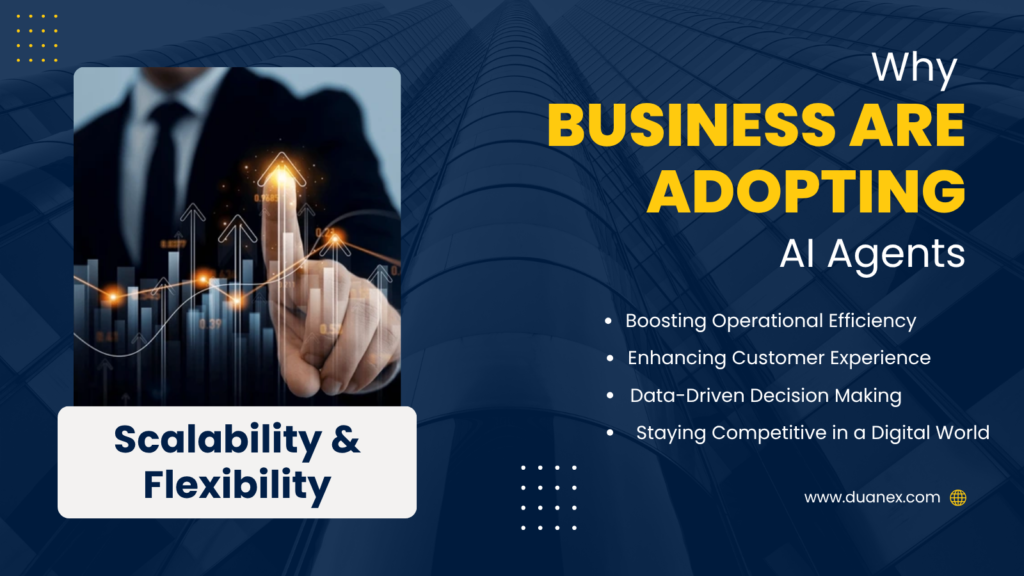
Why Businesses Are Adopting AI Agents
From streamlining operations to enhancing customer experiences, AI agents are versatile tools that can be tailored to virtually any industry. But why should businesses prioritize building a strategy around them?
1. Boosting Operational Efficiency
AI agents excel at automating repetitive, time-consuming tasks, freeing up human resources for more strategic work. For instance, AI-powered tools can handle data entry, process invoices, or manage supply chains with precision and speed. According to a 2023 McKinsey report, businesses that implemented AI automation saw a 20-30% reduction in operational costs within the first year.
By integrating AI agents, companies can optimize workflows, reduce errors, and scale operations without proportionally increasing costs. A well-defined AI agent strategy ensures these tools are deployed effectively, targeting high-impact areas of the business.
2. Enhancing Customer Experience
Today’s customers expect instant, personalized responses. AI agents, such as chatbots and virtual assistants, deliver 24/7 support, answering queries, resolving issues, and even recommending products based on user preferences.
An AI agent strategy allows businesses to design customer-facing systems that align with brand values, ensuring seamless and consistent experiences. For example, a retail company could use AI to offer personalized shopping recommendations, boosting customer satisfaction and loyalty.
For more information about AI agents in customer support, read our comprehensive guide on “AI Agents in Customer Support: Real-World Use Cases and Benefits”.
3. Data-Driven Decision Making
AI agents don’t just automate—they analyze. By processing vast amounts of data, AI agents uncover insights that humans might miss. Whether it’s predicting market trends, identifying customer behavior patterns, or optimizing pricing strategies, AI agents empower businesses to make informed decisions.
A strategic approach to AI agents ensures that data collection and analysis align with business goals. For instance, a logistics company could use AI to predict delivery delays based on weather patterns, enabling proactive adjustments that save time and money.
4. Staying Competitive in a Digital World
The adoption of AI is no longer optional—it’s a competitive necessity. Businesses that fail to integrate AI risk falling behind competitors who leverage these technologies to innovate and optimize. A 2025 Deloitte survey revealed that 85% of Fortune 500 companies have implemented AI strategies, with early adopters reporting a 15% increase in market share.
An AI agent strategy positions businesses to stay agile, adapt to market changes, and capitalize on emerging opportunities. It’s about future-proofing operations in an increasingly digital landscape.
5. Scalability and Flexibility
AI agents are inherently scalable, making them ideal for businesses of all sizes. Whether you’re a startup or an enterprise, AI agents can grow with your needs. A small business might start with a simple chatbot, while a multinational corporation could deploy a network of AI agents for global operations.
A strategic approach ensures that AI implementations are modular and adaptable, allowing businesses to expand their use of AI as technology evolves or new needs arise.
6. Mitigating Risks and Ethical Considerations
While AI agents offer significant advantages, their deployment must address potential risks such as data privacy and algorithmic bias. Ensuring compliance with regulations like GDPR or CCPA is critical to maintaining customer trust and avoiding legal repercussions. A comprehensive AI agent strategy incorporates robust data security measures and transparent practices to protect sensitive information.
Moreover, businesses must tackle ethical challenges, such as preventing biases in AI decision-making processes. By using diverse datasets and conducting regular audits, companies can ensure AI agents deliver fair and accurate outcomes. A well-crafted strategy balances innovation with responsibility, fostering trust and maximizing the benefits of AI adoption.
7. Real-World Impact of AI Agents
The transformative power of AI agents is evident in real-world applications across industries. For example, a healthcare provider implemented AI agents to streamline patient scheduling and triage, reducing wait times by 35% and improving patient satisfaction scores. Similarly, a financial services firm used AI to detect fraudulent transactions in real time, saving millions annually. These success stories underscore the tangible benefits of a strategic AI agent approach, from cost savings to enhanced service delivery.
To find out more about the potential of AI in different fields, grab our copy about “The Future of AI in Healthcare, Finance, and E-Commerce”
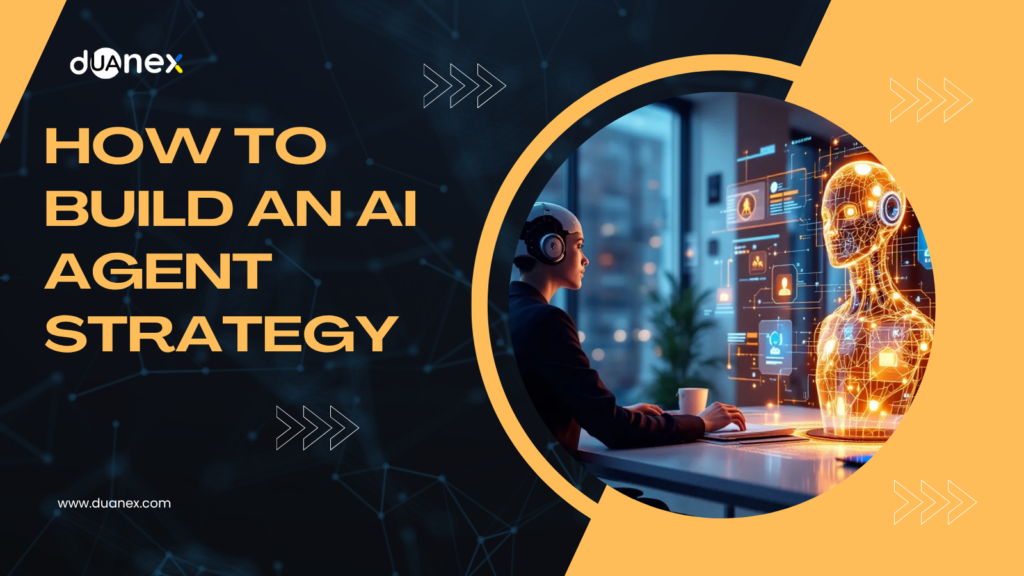
How to Build an AI Agent Strategy
Creating an effective AI agent strategy requires careful planning. Here are key steps to get started:- Identify Business Needs: Pinpoint areas where AI can have the most impact, such as customer service, marketing, or operations.
- Choose the Right Tools: Select AI platforms that align with your goals, whether it’s a customer-facing chatbot or an internal analytics tool.
- Integrate with Existing Systems: Ensure AI agents work seamlessly with your current tech stack to avoid disruptions.
- Train and Monitor: Continuously train AI agents with relevant data and monitor their performance to maintain accuracy and efficiency.
- Prioritize Ethics and Transparency: Address concerns like data privacy and bias to build trust with customers and employees.
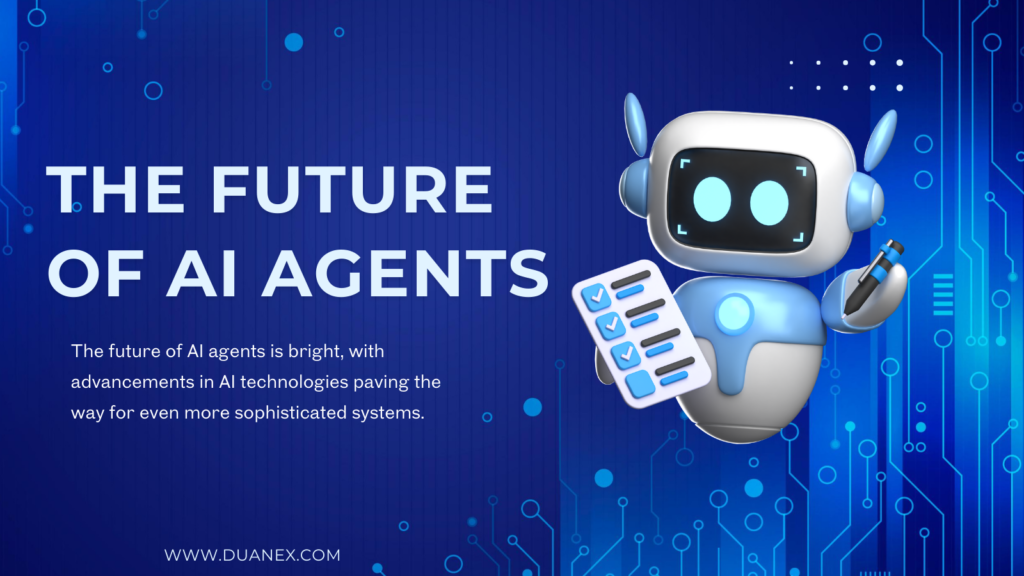
Word from Duanex
AI agents are revolutionizing how businesses operate, offering unmatched opportunities to enhance efficiency, personalize customer experiences, and drive data-informed decisions. By addressing risks and ethical considerations, companies can harness AI’s potential responsibly and effectively. A well-crafted AI agent strategy, supported by expert development from companies like Duanex, is not just a technological upgrade—it’s a roadmap to operational excellence, competitive advantage, and sustained growth. Businesses that act now to integrate custom-built AI agents strategically will lead their industries, navigating the challenges and opportunities of an AI-driven future with confidence.